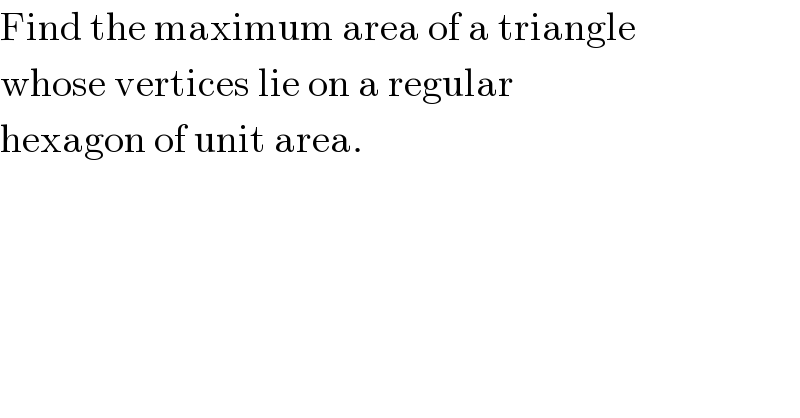
Question Number 111284 by Aina Samuel Temidayo last updated on 03/Sep/20

$$\mathrm{Find}\:\mathrm{the}\:\mathrm{maximum}\:\mathrm{area}\:\mathrm{of}\:\mathrm{a}\:\mathrm{triangle} \\ $$$$\mathrm{whose}\:\mathrm{vertices}\:\mathrm{lie}\:\mathrm{on}\:\mathrm{a}\:\mathrm{regular} \\ $$$$\mathrm{hexagon}\:\mathrm{of}\:\mathrm{unit}\:\mathrm{area}. \\ $$
Commented by mr W last updated on 03/Sep/20

Commented by mr W last updated on 03/Sep/20

$${max}.\:{triangle}\:=\frac{{hexagon}}{\mathrm{2}}=\frac{\mathrm{1}}{\mathrm{2}} \\ $$
Commented by Aina Samuel Temidayo last updated on 03/Sep/20

$$\mathrm{Just}\:\mathrm{explain}\:\mathrm{please}. \\ $$
Commented by Aina Samuel Temidayo last updated on 03/Sep/20

$$\mathrm{What}\:\mathrm{about}\:\mathrm{a}\:\mathrm{well}\:\mathrm{explanatory} \\ $$$$\mathrm{solution}?\:\mathrm{Thanks}. \\ $$
Commented by Her_Majesty last updated on 03/Sep/20

$${what}\:{is}\:{it}\:{you}\:{do}\:{not}\:{understand}??? \\ $$
Commented by Aina Samuel Temidayo last updated on 03/Sep/20

$$\mathrm{Isn}'\mathrm{t}\:\mathrm{there}\:\mathrm{a}\:\mathrm{proof}?\:\mathrm{How}\:\mathrm{do}\:\mathrm{we}\:\mathrm{know} \\ $$$$\mathrm{definitely}\:\mathrm{that}\:\mathrm{the}\:\mathrm{area}\:\mathrm{of}\:\mathrm{that} \\ $$$$\mathrm{triangle}\:\mathrm{is}\:\mathrm{half}\:\mathrm{of}\:\mathrm{that}\:\mathrm{of}\:\mathrm{the}\:\mathrm{hexagon}? \\ $$
Commented by mr W last updated on 03/Sep/20

$${i}\:{just}\:{don}'{t}\:{want}\:{to}\:{waste}\:{my}\:{time}\:{for} \\ $$$${obvious}\:{things}. \\ $$
Commented by Her_Majesty last updated on 03/Sep/20

$${it}'{s}\:{plain}\:{to}\:{see}\:{that}\:{the}\:{red}\:{lines}\:{cut}\:{the} \\ $$$${small}\:{triangles}\:{in}\:{two},\:{isn}'{t}\:{it}? \\ $$
Commented by Aina Samuel Temidayo last updated on 03/Sep/20

$$\mathrm{Not}\:\mathrm{really}.\:\mathrm{We}\:\mathrm{can}'\mathrm{t}\:\mathrm{just}\:\mathrm{assume}\:\mathrm{that}. \\ $$
Commented by Aina Samuel Temidayo last updated on 03/Sep/20

$$\mathrm{How}\:\mathrm{can}\:\mathrm{it}\:\mathrm{be}\:\mathrm{proven}\:\mathrm{and}\:\mathrm{solved} \\ $$$$\mathrm{mathematically}? \\ $$
Commented by Her_Majesty last updated on 03/Sep/20

$${two}\:{equilateral}\:{squares}\:{form}\:{a}\:{rhombus} \\ $$$${the}\:{diagonals}\:{each}\:{bisect}\:{the}\:{rhombus} \\ $$$${the}\:{red}\:{line}\:{is}\:{the}\:{longer}\:{diagonal} \\ $$$${we}\:{don}'{t}\:{need}\:{more} \\ $$
